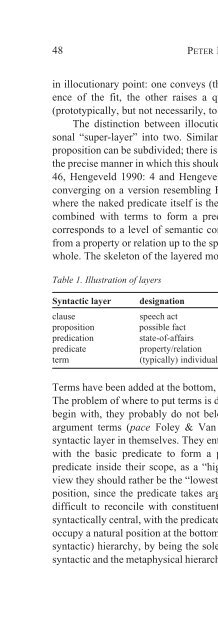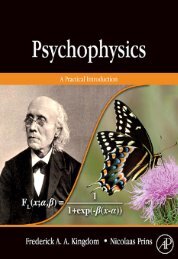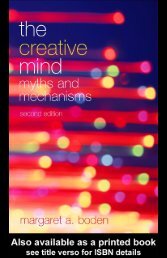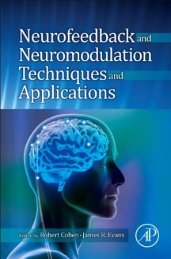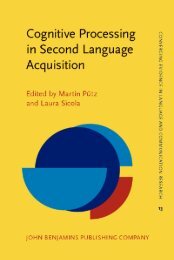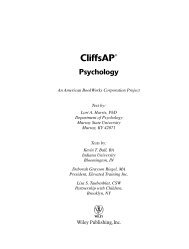Cognitive Semantics : Meaning and Cognition
Cognitive Semantics : Meaning and Cognition
Cognitive Semantics : Meaning and Cognition
You also want an ePaper? Increase the reach of your titles
YUMPU automatically turns print PDFs into web optimized ePapers that Google loves.
POLYSEMY AND DIFFERENTIATION IN THE LEXICON 105<br />
Closely related to natural forces are sense-impressions such as light/darkness,<br />
sound, heat/cold <strong>and</strong> smell.<br />
Ligga i puffen och lyssna till Lying on the little couch listening to<br />
tystnaden. Se ljuset från gatlyktan the silence, seeing the beam from the<br />
slå dagrar och skuggor mot taket. streetlamp throwing light <strong>and</strong> shade on<br />
the ceiling.<br />
Håkans snarkningar slog emot mig i I was confronted with Håkan’s snoring<br />
trappan. in the staircase. [Literally: H’s snoring<br />
hit me..]<br />
Hettan slog emot honom som en The heat slammed into him like<br />
fast materia. something solid.<br />
Lukten som slog upp kunde tagit A smell fumed back, enough to suffocate<br />
kål på en gödselstack, vad styrkan a sewage farm.<br />
beträffade.<br />
All these examples describe some type of physical contact <strong>and</strong> share the<br />
component TRAVEL, the core component HAPPEN CONTACT <strong>and</strong> perhaps<br />
even FORCE as in the prototypical case. (The intensity of light <strong>and</strong> smell etc.<br />
represents a variety of force that has a concrete, physical basis.)<br />
There are also a number of subjects which are strictly Mental <strong>and</strong> cannot<br />
be concretely perceived by the senses. A clear case is Tanken slog honom att<br />
han kunde ha fel ‘The thought struck him that he could be wrong’. Examples<br />
such as this one are based on a metaphorical principle such as “an idea is a<br />
force” (cf. Lakoff & Johnson 1980). In general, the subject is a that-clause<br />
expressing the thought as a proposition. Like most clausal subjects, it is<br />
usually extraposed with a dummy subject det ‘it’:<br />
Det slog honom att det var inte så It struck him that he didn’t know<br />
många vanliga människor han kände. very many ordinary people<br />
Åter slog det mig att en del av de It hit me again that some of the people<br />
människor som kom in i vagnen who walked in the trailer to wish me<br />
för att önska mig lycka till inte good luck had not even been born when<br />
ens var födda när jag redan hade<br />
blivit stjärna.<br />
I was already a star.<br />
Det slog mig att det var mycket It occurred to me it had been quite a<br />
länge sedan jag känt mig generad. while since l ‘d felt embarrassment.<br />
An alternative to using an extraposed subject clause is to passivize slå (signalled<br />
with the ending -s in Swedish):


